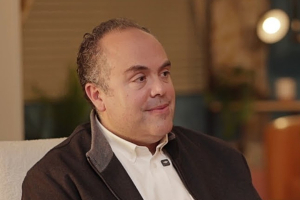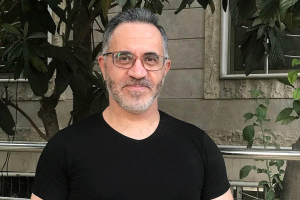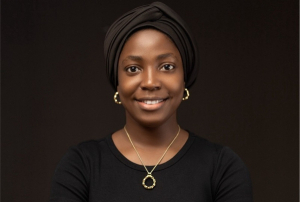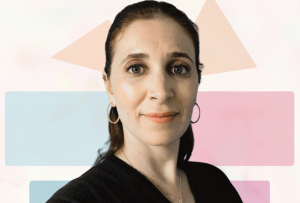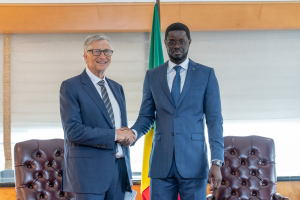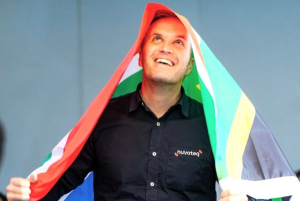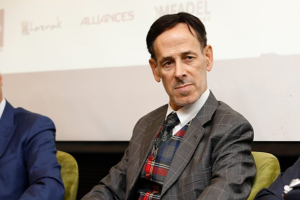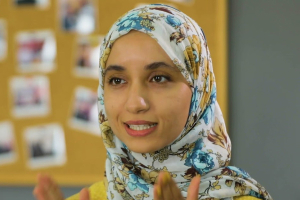Mohammed El-Beltagy Turns AI Into Efficiency Lever for Businesses
Moroccan entrepreneur Mohammed El-Beltagy has built his career around applying artificial intelligence to business performance. He founded and leads Optomatica, a deep-tech consulting firm specializing in AI, machine learning and advanced optimization.
Optomatica focuses on accelerating the transition from ideas to final products by developing tailored AI systems that improve decision-making and data management. The company positions itself as “AI-First” and adapts its technologies to operational contexts across industries.
Founded in 2003, Optomatica operates in fintech, sports technologies, digital health, conversational intelligence, logistics, and process optimization. The firm aims to create practical AI applications and unlock new technical opportunities for clients and their markets.
Alongside Optomatica, El-Beltagy has pursued multiple ventures. In 2014, he co-founded Racefox, a digital coach for running and cross-country skiing. Four years later, he launched ConsultingPad, a platform linking consultants with enterprises, and joined AIM Technologies, an AI-focused firm, as a board member.
In 2021, he helped establish Optofolio, a wealth management platform; Jilatee, a circular fashion company; and DFin Holding, a fintech venture.
Since 2022, El-Beltagy has served as co-founder and chief technology officer of Flend, a financing platform that uses data and technology to support small and medium-sized enterprises. That same year, he founded Racemate, a sports technology company, where he chairs the board and serves as CTO.
El-Beltagy graduated in biomedical engineering from the American University in Cairo in 1994. He earned a master’s degree in mechatronics from Lancaster University in 1996 and a PhD in mechanical engineering from the University of Southampton in 2000.
His professional record includes senior positions in technology firms. From 2007 to 2017, he worked at Hive Streaming, a live video distribution company, as chief scientist and later as innovation director. Between 2013 and 2017, he served as innovation director at Novelari, an innovation accelerator. More recently, from 2020 to 2021, he was CTO at Elves, an Egypt-based travel app.
This article was initially published in French by Melchior Koba
Adapted in English by Ange Jason Quenum
Blademy, FasterCapital Partner to Boost Digital Health in West Africa
-
Blademy partnered with FasterCapital under its EquityPilot program to scale Bluetooth-enabled health devices for chronic disease management in West Africa.
-
The partnership will provide capital, mentorship, commercialization support, and fundraising assistance to accelerate deployment.
-
Pilots will launch in Ghana and Senegal within 6–18 months before scaling to Côte d’Ivoire, Nigeria, and Burkina Faso.
The World Health Organization warned that Africa could face a shortage of 6.1 million health workers by 2030 if urgent action is not taken. Digital health is emerging as a key lever to close the gap and expand care access across the region.
Blademy, an initiative of Côte d’Ivoire’s Agence Digitale N’zassa (ADN), signed a strategic partnership with global incubator FasterCapital through its EquityPilot program. The agreement seeks to strengthen digital health in West Africa with locally adapted and affordable solutions.
“Blademy illustrates the kind of pragmatic, high-impact innovation we seek: simple hardware, smart software, and a business model tailored to underserved markets. Our EquityPilot program will provide the capital, network, and technical guidance required to transform demonstrable pilots into scalable impact on health systems,” said FasterCapital founder and CEO Hesham Zreik.
The collaboration will give Blademy growth capital, international mentorship, commercialization support, and fundraising assistance. These resources aim to accelerate the rollout of its offline, Bluetooth-enabled health platform designed to manage diabetes, hypertension, and gout.
Blademy’s solution combines low-cost Bluetooth glucometers, blood pressure monitors, and uric acid testers with an Android/iOS application that functions offline. Data is stored locally and later shared with clinicians, enabling patient monitoring in rural and peri-urban areas while reducing chronic care costs.
The initiative comes as digital health grows rapidly in West Africa but remains hindered by weak connectivity and reliance on imported equipment. Millions in the region suffer from chronic diseases, while shortages of health professionals add pressure to fragile systems. Blademy’s model addresses these local realities by focusing on affordability and offline functionality.
With FasterCapital’s support, Blademy will implement a 6–18 month roadmap starting with pilot projects in Ghana and Senegal. Expansion is planned for Côte d’Ivoire, Nigeria, and Burkina Faso. Long term, the company aims to become a leading digital health player in West Africa, strengthening prevention and reducing the economic burden of chronic illnesses.
This article was initially published in French by Samira Njoya
Adapted in English by Ange Jason Quenum
Nigerian Entrepreneur Nana Aisha Onisarotu Builds Digital Platform to Streamline Emergency Care
West Africa faces persistent challenges in managing medical emergencies, with delayed ambulance responses often linked to preventable deaths. Nigerian physician and entrepreneur Nana Aisha Onisarotu is developing digital solutions to improve efficiency and coordination across the sector.
She founded ResQCore in 2023 as a platform dedicated to emergency healthcare management. The system connects ambulance operators, hospitals, insurers, and individuals through a digital infrastructure that integrates vehicle tracking, hospital capacity monitoring, and centralized service requests.
ResQCore deploys automation to manage ambulance allocation and leverages artificial intelligence to reduce intervention delays. The approach enhances coordination between stakeholders and improves the traceability of emergency responses.
Before ResQCore, Onisarotu co-founded The Ambulance Company in Nigeria in 2020. The firm manages both urgent and non-urgent transport for patients, schools, companies, and events in Lagos and surrounding areas. Its fleet includes ambulances equipped with monitoring devices, advanced medical equipment, and communication systems.
Onisarotu earned her medical degree in 2017 from Danylo Halytsky National Medical University in Lviv, Ukraine. She completed a master’s in global health at Vrije Universiteit Amsterdam in 2019 and is currently pursuing healthcare management studies at Pan-Atlantic University in Lagos.
Her professional experience includes serving as a program director at Nigeria’s Ministry of Health in 2021 and working as a physician at Queen Elizabeth Hospital King’s Lynn in the United Kingdom in 2023.
This article was initially published in French by Melchior Koba
Adapted in English by Ange Jason Quenum
Loubna Lamrani Supports Mothers Through Digital Maternity Platform
Moroccan pharmacist and entrepreneur Loubna Lamrani seeks to reshape the maternity experience in Morocco through Mama Box, a digital platform designed to support mothers. Lamrani, who co-founded the initiative in 2023, received the 2025 “Coup de cœur” Jury Prize at the Orange Social Entrepreneur Award for Africa and the Middle East (POESAM).
Lamrani launched Mama Box with Fatine Rizlene Labraimi and Hanae Bouayad. The initiative provides free, personalized, and reliable support to expectant and new mothers during the critical maternity period.
The project distributes boxes in maternity wards, partner medical practices, and through its online platform. Each box includes baby and mother care products, such as skincare items and breastfeeding accessories.
In addition to physical boxes, the platform offers discount vouchers, a practical guide, and unlimited access to Mama Bot, a virtual assistant powered by artificial intelligence.
“Mama Box was born from a simple mission: to accompany mothers in the wonderful adventure of maternity,” the company said. “Each box is a celebration of life, filled with carefully selected products, special offers, and a wealth of practical advice. Our selections are guided by healthcare professionals and driven by the belief that every mother deserves the best for herself and her baby.”
Lamrani has practiced pharmacy since 2007 at Pharmacie Moulay Ismail. In 2011, she co-founded COSMOBIO Parapharmacie, a space dedicated to health and wellness in Morocco.
She holds a doctorate in pharmacy from the Faculty of Pharmacy of Monastir, earned in 2014, and a master’s degree in pharmaceutical management from Laval University in Canada, obtained in 2007.
This article was initially published in French by Melchior Koba
Adapted in English by Ange Jason Quenum
Gates Foundation Commits Over $10 Million to Senegal’s Tech New Deal
- The Gates Foundation pledged more than $10 million to support Senegal’s New Deal technologique, its national digital strategy launched in February 2025.
- The partnership will fund a universal digital ID, an AI hub for health and agriculture, and a Delivery Unit to oversee project transparency and efficiency.
- Senegal’s digital strategy requires $2 billion, of which $155 million still needs to be secured.
Senegal signed a $10 million-plus partnership with the Gates Foundation on September 24 to accelerate its national digital strategy, known as the New Deal technologique. The agreement was finalized on the sidelines of the 80th United Nations General Assembly in New York, the state broadcaster RTS reported.
Le Président a reçu en audience M. @BillGates, Président de la Gates Foundation.
— Présidence Sénégal (@PR_Senegal) September 24, 2025
Cette rencontre a permis de conclure un partenariat stratégique de plus de 10 millions de dollars pour accélérer le #NewDealTechnologique et faire du Sénégal un hub africain d’innovation numérique. pic.twitter.com/kBJk37Sigr
The program, launched in February 2025 by President Bassirou Diomaye Faye, aims to transform public services, strengthen digital sovereignty, and establish Senegal as a regional technology hub by 2034.
The deal provides for the rollout of a universal digital identity system, the creation of an artificial intelligence hub focused on health and agriculture, and the establishment of a Delivery Unit to ensure project transparency and efficiency.
The partnership follows an initial meeting between Bill Gates and President Faye during the 79th UN General Assembly, when both sides agreed to expand cooperation in areas including AI-assisted agriculture, sanitation, and digital innovation across strategic sectors.
Senegal budgeted CFA1,105 billion (about $2 billion) for the New Deal technologique. Authorities have already identified CFA950 billion, leaving CFA155 billion still to be mobilized.
Officials expect the Gates Foundation’s contribution to accelerate the implementation of priority projects, expand inclusive digital services for citizens, and attract additional private investment into Senegal’s tech ecosystem.
This article was initially published in French by Samira Njoya
Adapted in English by Ange Jason Quenum
10mg Credit Boosts Nigerian Healthcare Access with AI-Powered Financing
-
10mg Credit, a Nigerian fintech solution, offers instant, collateral-free credit to healthcare providers for medical supplies.
-
The platform leverages AI to assess creditworthiness, approving most applications within minutes.
-
Since its launch, 10mg Credit has financed over 6,000 healthcare providers, disbursing more than $3.4 million.
Access to financing remains a significant hurdle for small and medium-sized enterprises across Africa. In Nigeria, a nascent startup has introduced a solution specifically targeting the healthcare sector.
10mg Credit, a fintech solution developed by Nigerian startup 10mg Health, provides instant, collateral-free credit to healthcare facilities. These facilities use the credit to procure medicines and medical equipment. Christian Nwachukwu founded the startup in 2022.
The company said its AI-driven system quickly analyzes transaction histories to approve most applications within minutes, eliminating paperwork and delays, and provides flexible, transparent repayment plans to help users manage expenses without stress.
Healthcare establishments can opt for 10mg Credit when making purchases, either through its platform or via partner distributors. The approval process relies on AI technology, which evaluates applicants' creditworthiness in real-time. This system grants credit within minutes, requires no physical collateral, and offers repayment terms tailored to each facility's cash flow.
By enabling hospitals to pre-finance purchases, 10mg Credit helps reduce service interruptions and enhances the healthcare system's resilience. Since its inception, the solution claims to have financed over 6,000 healthcare providers, with a total volume exceeding $3.4 million and a loan approval rate near 60%. However, the startup faces challenges in managing repayment risk, securing data, and extending coverage to less connected areas.
Regarding data protection, the startup asserts it only collects information necessary for fair and instant decisions, "encrypting it end-to-end for maximum protection."
This article was initially published in French by Adoni Conrad Quenum
Adapted in English by Ange Jason Quenum
Adriaan Kruger Leverages Digital Tools to Streamline Clinical Research
Adriaan Kruger, a South African technology entrepreneur, is making his mark in digital health by designing platforms for clinical research. He is the cofounder and chief executive of nuvoteQ.io, a software development firm. In September, he was selected among the ten finalists of Africa’s Business Heroes, whose semifinal took place in Dakar, Senegal.
Founded in 2014, nuvoteQ.io builds digital solutions to manage clinical trials and life sciences data. The company aims to replace paper-based data collection with digital tools.
Among its key products is Kronus, a web-based clinical trial management platform. It enables data entry, workflow automation, and real-time access to information while ensuring regulatory compliance. The firm also developed Nukleus, an eSource platform that removes manual data entry, and SafetyBase, a pharmacovigilance tool that centralizes and structures safety data.
Kruger co-founded Scigenix in 2023, a health data company where he serves on the board. In 2024, he helped establish the nuvoteQ Foundation, which supports and protects health technologies critical to public health.
He also leads the tech team at Clinical Trial Community, a platform that helps identify clinical trial sites in Africa. In addition, he serves as vice president of SACRA South Africa, an association dedicated to clinical research.
Kruger graduated with a bachelor’s degree in information technology from the University of Pretoria in 2005 and earned a bachelor’s degree in business management in 2010 from the Unisa Graduate School of Business Leadership.
He began his career in 2005 at iOCO, an Oracle technology solutions provider, where he worked as a consultant and later as an account and sales manager, before leading the Oracle technologies and hardware division. In 2014, he joined Cytespace Research Private as a senior associate, focusing on patient-centered data solutions for clinics and hospitals.
This article was initially published in French by Melchior Koba
Adapted in English by Ange Jason Quenum
Moroccan Entrepreneur Karim Amor Uses AI to Advance Health Diagnostics and Startup Ecosystem
-
Karim Amor founded Epineon, a health-focused AI startup launched in 2021.
-
Epineon develops metabolic health software and runs a startup incubation program.
-
Amor also co-founded NexTraction, which applies AI to streamline startup due diligence.
Moroccan entrepreneur Karim Amor is expanding his footprint in technology and health innovation, applying artificial intelligence (AI) to metabolic health and startup development.
Amor is founder and CEO of Epineon, a company launched in 2021 that builds AI-powered software to support diagnostics, health monitoring and metabolic longevity. The firm integrates multiple fields, including robotics, biomimetics, biotechnology, data analytics and quantum technologies.
Epineon also operates Synergeon CollaboraTech, an incubation program that provides mentorship to early-stage businesses. Its platform uses sensitive metabolic data to design personalized nutrition and fitness plans.
Beyond Epineon, Amor has established a diverse portfolio. He founded JET Group Maroc, which invests in technology, social housing development and organic cosmetics. Since 2020, he has also chaired MeM, a networking hub for Moroccan entrepreneurs.
Most recently, in June 2025, Amor co-founded NexTraction, a venture designed to assist investors and founders in startup validation. The firm’s AI-driven platform automates due diligence by offering real-time market analysis, risk signal detection and predictive scoring.
This article was initially published in French by Melchior Koba
Adapted in English by Ange Jason Quenum
Malawi’s Sanga Kanthema Reinvents Medical Devices for Africa
Malawian engineer and entrepreneur Sanga Kanthema is reshaping healthcare in southern Africa through biomedical innovation and robotics. Based in Blantyre, he leads Dolphin Health Innovation, a start-up designing smart medical devices for low-resource environments.
Kanthema, who works at the intersection of electronic engineering and equipment manufacturing, focuses on building tools that meet the realities of rural Africa. Since founding Dolphin Health Innovation in 2018, he has pushed to equip healthcare systems with telehealth technologies tailored for areas with weak infrastructure.
His company develops real-time ECG sensors that can transmit cardiac signals remotely, even in zones with limited connectivity. These devices rely on algorithmic data compression and intuitive mobile interfaces, allowing for continuous monitoring, early diagnosis, and remote intervention.
Kanthema also founded Qubix Robotics in 2022 to drive local manufacturing. The company builds CNC machines, 3D printers, and robotic systems to automate industrial production across healthcare, transport, and telecom sectors. Its mission: to strengthen Africa’s industrial independence.
Beyond entrepreneurship, Kanthema champions tech education. As a TME Education ambassador, he promotes electronics training in underserved regions. He also represents IdeaXme, a global network supporting socially-driven science and innovation.
This article was initially published in French by Melchior Koba
Edited in English by Ange Jason Quenum
Khaoula Ben Ahmed Drives Innovation for People With Disabilities
Khaoula Ben Ahmed uses innovation to promote independence. Through her company, she merges technology and design to improve daily life for people with disabilities.
Ben Ahmed is a Tunisian entrepreneur and engineer. She co-founded and leads GEWINNER, a company that builds mobility solutions for people facing physical challenges.
She started GEWINNER in 2019 with Ghofrane Ayari, Souleima Ben Temime, and Sirine Ayari. The team develops advanced products using artificial intelligence, electronic design, and ergonomic principles. GEWINNER aims to boost autonomy and quality of life for people with limited mobility by putting cutting-edge technology to work.
The company’s top product, MOOVOBRAIN, marks a breakthrough in Tunisia’s medical equipment sector. MOOVOBRAIN is an intelligent control system installed in standard electric wheelchairs. It lets users steer their chairs using brain signals or eye movements, thanks to electroencephalogram (EEG) and eye-tracking technologies. This system gives new options to people with severe mobility challenges.
The device offers multiple control modes. Users can guide their wheelchairs with facial expressions—like smiles, blinks, or head movements—or by voice command. It also retains classic joystick controls for those who prefer traditional use. All system features operate through a dedicated mobile app, granting remote access to technical support, product customization, and maintenance.
Ben Ahmed’s journey began at the University of Tunis El Manar, where she earned a bachelor’s degree in biomedical engineering in 2017. She completed a master’s in research, biophysics, radiophysics, and medical imaging at the Higher Institute of Medical Technologies of Tunis in 2019. In 2021, she added a master’s in innovation management from Carthage Business School.
Her work has won major recognition. In 2021, Managers and Huawei named her Female Entrepreneur of the Year in technology. In 2024, she and her team secured third place in the Young Inventors Prize from the European Patent Office’s European Inventor Award.
This article was initially published in French by Melchior Koba
Edited in English by Ange Jason Quenum


